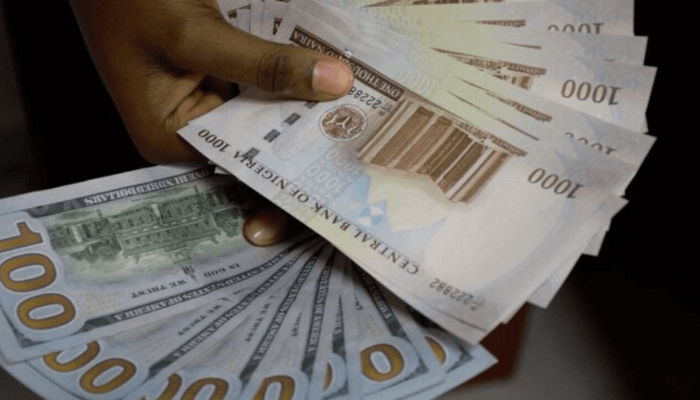Getting the balance of payment facilities from multilateral institutions and increasing the export of goods and services are part of measures that can boost the dollar supply and shore up the value of the naira, according to economists.
The naira has lost 25.65 percent and 65.65 percent of its value in two months at the parallel market and official market respectively after the liberalisation of the foreign exchange market.
On June 14, 2023, the Central Bank of Nigeria (CBN) collapsed all segments of the FX market into the Investors and Exporters (I&E) window.
The naira fell to 955 per dollar at the parallel market as against 760 on June 13 before the FX unification.
At the I&E window, the naira has depreciated by 65.65 percent to N781.34 per dollar as of Thursday, compared to N471.67/$1 quoted on June 13.
The naira depreciation has been attributed to increased demand for dollars amid a shortage of the greenback.
“Until there is enough supply to meet FX demand, the ability to stabilize the exchange rate will be difficult and might force the CBN to use its limited reserves to intervene to stabilize the rate,” Yemi Kale, partner, and chief economist at KPMG Nigeria said.
According to CBN data, Nigeria’s gross official reserves fell more slowly by $167 million month-on-month (m/m) to around $34 billion at the end of July 2023, compared to a fall of $975 million in June.
The drop in the official reserves in July is consistent with the steady attrition observed since August 2022, according to a report by FBNQuest.
The report noted that year-to-date, the reserves have fallen by roughly $447 million each month on average, and by nearly $440 million since August 2022.
The decreasing official reserves have placed limitations on the central bank’s capacity to engage in FX market interventions, analysts at FBNQuest said.
Some analysts said Nigeria’s official reserves cannot cover more than 4.4 months of import based on the first-quarter 2023 monthly average import bill of $3,901 million.
FBNQuest said the total reserves as of the end of July 2023 covered 7.0 months of merchandise imports on the basis of the balance of payments for the 12 months to December 2022 and 5.3 months when service was added.
“The issue of four months of import is not the problem. The issue right now is there is a backlog of FX repatriation that has not been met, for example, the airlines,” Jimi Ogbobine, head of Agusto Consulting, said.
He said the backlog sends a signal to investors that there is still a bit of lost ground to cover. As a result of that, investors will ask questions about why Nigeria is not meeting its backlog, he added.
“How do we meet supply? Mainly two ways. One, we can accrue gradual supply from NNPC remittances to the segregation account via the CBN. The NNPC supplies the CBN with dollars. This is going to be a slower means; it takes time,” he said.
Ogbobine said the second is getting some form of balance of payment facilities from multilateral organizations like the World Bank. “It will be able to help the country meet some of its obligations and send a positive signal to the global investors.”
“To increase supply from all sides — increase exports of goods and services to earn dollars, drive foreign direct investment, increase foreign portfolio investments, increase foreign remittance,” Ayodele Akinwunmi, relationship manager, corporate banking at FSDH Merchant Bank Limited, said.
On the demand side, he said Nigerians must have an appetite for locally consumed goods.
“Various supports must be given to the domestic manufacturers and institutions so that they can increase the quality and quantity of their products and services to enable them to satisfy local demand,” Akinwunmi said.
Uche Uwaleke, professor of Capital Market at the Nasarawa State University Keffi, said: “Against the backdrop of the relative healthy reserves, the immediate solution to the liquidity challenge in the forex market is for the CBN to return to a managed float regime involving increased intervention in the I & E window, now the Nigerian forex market for all transactions.”
He said the CBN may revert to a complete naira float in the medium term when the anticipated capital inflows will have helped to stabilize the market.
Responding to how to increase dollar supply, Aminu Gwadabe, national president of the Association of Bureau De Change Operators of Nigeria (ABCON), said: “We should all aspire as Nigerians to have a stable exchange rate. The financial architecture should be reviewed to include BDCs in the harmonized markets.”
According to him, other ways to shore up dollar supply include sourcing of foreign finance through asset-linked bonds and the monetary and fiscal authorities creating an enabling environment and friendly policies.
He said there is a need to sustain stakeholder engagements among regulators, fintech, financial institutions, and market participants.
Gwadabe advised the government to employ stiffer measures on platforms, like crypto platforms as they operate in different jurisdictions with a lack of standardized regulations.
“There is also the request for clarity from the CBN and data sharing among players. ABCON is desirous to partner with the apex bank and the Federal Government for an elaborate dialogue and engagement to champion paths to naira recovery,” he said.
READ ALSO: Don’t dole out cash, create jobs, APC chieftain tells Tinubu
Source: https://businessday.ng/




